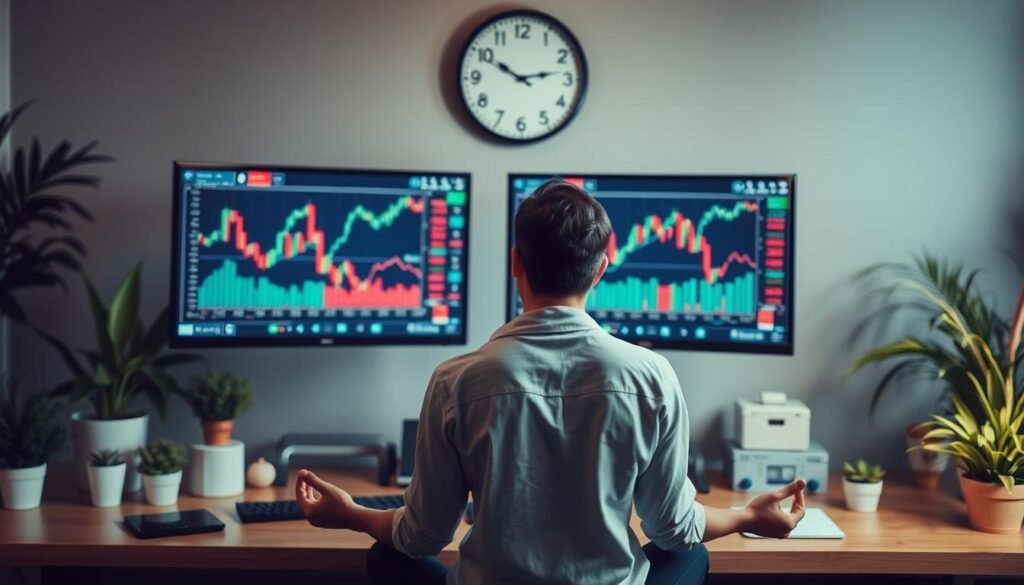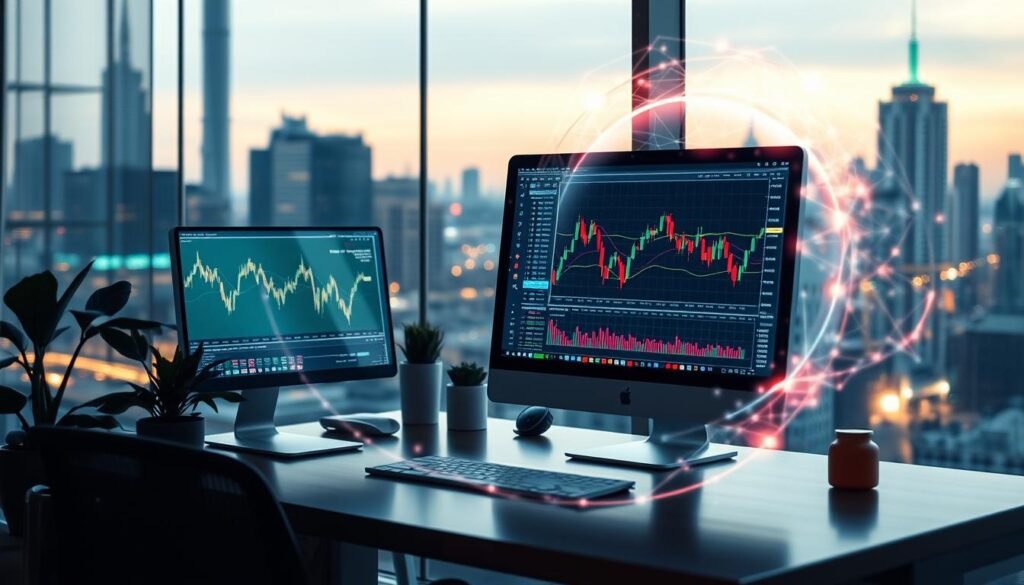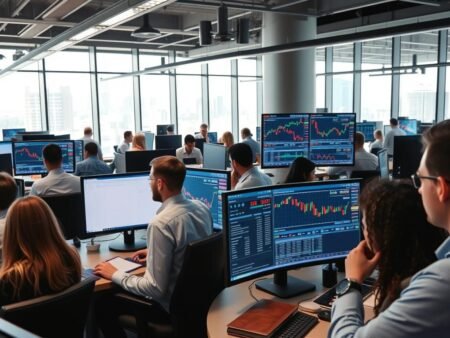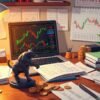In the world of proprietary firms, or prop firms, the pressure is as high as the money at stake. Traders must manage their portfolios and their prop trading mental health. Success in this environment isn’t just about technical skills or market knowledge. It’s also about managing psychological pressure in trading.
Ignoring this pressure can harm decision-making and mental health. Understanding the psychological demands and using strong coping strategies is key for traders. This section will show why dealing with these pressures is essential. It will also explain how to manage them well to improve trading and mental health.
To learn more about this important aspect of trading, check out the resources at prop firms.
Key Takeaways
- Recognize the significant impact of psychological pressure on traders at prop firms.
- Appreciate the importance of prop trading mental health for sustained performance and decision-making.
- Understanding the necessity for strategies aimed at managing psychological pressure in trading.
- Learn how prop firms can support traders through education and tailored stress-management resources.
- Discover further resources on how to navigate the challenges of prop trading at prop firms.
Understanding the Psychology of Prop Trading
Prop trading mixes big financial chances with big emotional challenges. For those in prop firms, knowing the psychological pressures is key. It boosts performance and helps manage prop firm stress and coping with prop trading anxiety.
Traders face the big task of handling a lot of money. This can make them stressed, affecting their choices and plans. Also, the ups and downs of wins and losses can deeply affect their minds. This shows the need for strong mental health plans in this high-risk field.
Every trade can affect a trader’s emotional state, making mental toughness crucial in prop trading.
In a world where uncertainty is always there, staying focused and calm is a big plus. Traders need ways to handle the stress of these pressures well. Here’s a table showing common psychological challenges and how to deal with them.
| Challenge | Impact on Trader | Management Strategy |
|---|---|---|
| High Capital Responsibility | Increased stress and potential for risk-averse decisions | Regular performance reviews and risk management training |
| Emotional Impact of Wins and Losses | Impact on self-esteem and decision fatigue | Mental conditioning to detach from outcomes |
| Constant Decision Making | Decision fatigue leading to burnout | Structured decision-making processes and breaks |
| Market Volatility | Anxiety and reactive decision-making | Emotional control training and stress reduction practices |
In short, prop trading’s mental side is as important as its financial side. Traders need both financial smarts and mental toughness. This helps a lot in coping with prop trading anxiety and improving performance in managing prop firm stress.
Developing a Resilient Mindset for Prop Trading Success
Success in proprietary (prop) trading needs more than just knowing the numbers. It also requires a strong mental game. Building psychological resilience in prop trading is key to handling the market’s ups and downs. This part explores the important traits and strategies for a resilient trading mindset.
Essential Mindset Traits for Prop Traders
To do well in prop trading, certain mindset traits are crucial:
- Discipline: Sticking to trading plans and strategies, even when the market is wild.
- Objectivity: Making decisions based on data and market trends, not emotions.
- Patience: Taking a long-term view to make big gains.
Strategies for Building Mental Resilience
Building mental resilience in prop trading involves specific strategies:
- Routine Development: Creating a daily routine for analysis and review to stay consistent and reduce stress.
- Mindfulness Practices: Using techniques like meditation or deep breathing to stay focused and calm.
- Visualization Techniques: Imagining successful trades and outcomes to build a success mindset.
- Proper Risk Management: Using systematic risk management to protect trading capital and limit losses.
Using these prop trading mindset strategies boosts a trader’s ability to face market challenges. A trader with these traits and strategies can stay mentally sharp and resilient. This is vital for navigating the ups and downs of prop trading.
Navigating Psychological Challenges in Prop Trading
In the high-stakes world of proprietary trading, navigating psychological challenges is as critical as mastering financial strategies. This section delves into common psychological hurdles and provides actionable strategies to tackle them effectively. Ensuring that overcoming psychological obstacles in prop trading becomes a systematic component of a trader’s routine.
Fear of loss, overconfidence, and burnout are prominent psychological challenges that can distort a trader’s decision-making process. Recognizing these challenges is the first step towards managing them. Below, we explore various tactics to deal with these issues, emphasizing continuous improvement and self-assessment.
- Development of a Robust Trading Plan: Structuring a well-thought-out trading plan can mitigate fear and provide clear guidelines which reduce emotional decision-making.
- Maintenance of a Trading Journal: By keeping a record of all trades, traders can reflect on both successful and unprofitable decisions to fine-tune their strategies and control overconfidence.
- Engagement in Continuous Learning: Updating knowledge and skills through continuous education helps traders stay ahead, reducing the risk of burnout caused by monotonous routines.
Moreover, structured peer discussions and mentorship can play pivotal roles in overcoming psychological obstacles in prop trading. These engagements encourage sharing of experiences and strategies, fostering a community of learning and mutual support.
| Psychological Challenge | Impact on Trading | Actionable Steps |
|---|---|---|
| Fear of Loss | May lead to premature selling | Adhere to predefined exit strategies |
| Overconfidence | Can result in overtrading | Implement risk management rules |
| Burnout | Reduces operational efficiency | Take scheduled breaks; diversify activities |
Successfully navigating psychological challenges in prop trading hinges on the trader’s ability to integrate these strategies into their daily trading routines. The focused application of these methodologies not only boosts trading performance but also enhances overall well-being and career longevity in the competitive sphere of prop trading.
Addressing the Unique Stressors of a Prop Firm Environment
Prop trading is very intense, bringing special challenges. It needs good ways to handle prop firm stress management and managing psychological pressure in trading. This part talks about the usual stress for prop traders and how to deal with it in a lasting way.
Identifying Common Stressors in Prop Trading
- High performance expectations push traders hard, causing a lot of stress.
- 24/7 global markets mean traders must stay alert always. This disrupts sleep and leads to constant tiredness.
- High leverage makes big losses as well as gains. This puts a lot of mental pressure.
Customized Stress Management Techniques for Traders
- Setting realistic trading goals helps set clear aims and achievements.
- Getting enough rest and time to relax helps fight fatigue and keeps decision-making sharp.
- Building a supportive trader community helps share the mental load. This boosts everyone’s strength together.

Using these special stress management methods in prop trading helps a lot. It not only helps with managing psychological pressure in trading but also keeps mental health strong. This is key for lasting success in trading. By using these strategies, traders can handle market pressures better, leading to better job and personal life.
Tactics for Coping with Prop Trading Anxiety
Prop trading is a high-pressure field that can affect mental health. It’s important to find ways to deal with coping with prop trading anxiety. This helps keep performance up and mental health strong.
Effective strategies include having a routine, using relaxation techniques, and balancing work and life. Prop trading mental health can improve by using these methods.
- Having a daily routine helps reduce uncertainty.
- Relaxation techniques like deep breathing or yoga can help manage stress.
- Regular exercise can lower anxiety and improve health.
- Keeping social connections and a support network is key.
It’s crucial to balance work and personal life to coping with prop trading anxiety. This approach helps manage immediate stress and supports long-term prop trading mental health.
| Technique | Description | Benefits |
|---|---|---|
| Deep Breathing | Controlled breathing exercises to calm the mind and body. | Reduces anxiety, improves focus, lowers stress levels. |
| Meditation | Practices like mindfulness to achieve mental clarity and emotional calmness. | Enhances emotional health, lengthens attention span, may reduce age-related memory loss. |
| Physical Exercise | Regular body movement, including gym workouts, running, or sports. | Boosts energy, improves mood, decreases feelings of depression, anxiety, and stress. |
| Work-Life Balance | Maintaining a healthy division between career and personal life. | Prevents burnout, increases well-being, sustains performance levels. |
Using these techniques helps with coping with prop trading anxiety and improves prop trading mental health. This leads to a more successful and sustainable trading career.
Prop Trading Mental Health: Maintaining Your Wellbeing
In the demanding world of prop trading, focusing on prop trading mental health is key. It boosts decision-making and trading performance. Managing psychological pressures is crucial for long-term success.
The Importance of Mental Health in Trading
Mental health is vital in prop trading, where stress is high. Good mental health helps traders make sharp, clear decisions. It keeps them free from stress and anxiety.
Practical Wellbeing Practices for Traders
- Start a daily routine with physical and mental exercises to stay sharp.
- Get professional mental health support for trading’s unique challenges.
- Have hobbies and interests outside trading to keep a balanced life. This helps your trading by giving breaks and reducing burnout.
It’s also key to have a supportive trader community. Use resources for managing trading stress. By focusing on prop trading mental health, traders can stay well and perform at their best.
The Role of Emotional Control in Prop Firm Trading
Emotional control is key in prop trading, where choices can greatly affect money and prop trading mental health. Traders who control their emotions can stay focused. This helps them make better decisions and build psychological resilience in prop trading.
In prop trading, fear and greed often lead to quick decisions. By knowing these emotions, traders can avoid acting on impulse. Switching from emotional to analytical thinking is vital for lasting success in a prop firm.
- Acknowledging emotional states before trading
- Setting clear, rules-based trading strategies
- Conducting regular reviews of trade outcomes and emotional responses
These steps help traders manage their feelings better. They also improve their ability to follow their trading plans.
| Emotion | Impact on Trading | Control Strategy |
|---|---|---|
| Fear | May cause premature sale of assets | Stress-testing portfolio against market conditions |
| Greed | Leads to holding assets too long | Profit targets and stop-loss orders |
| Anxiety | Causes indecision and paralysis | Systematic decision-making processes |
This table shows common emotional challenges in prop trading and how to control them. By managing emotions, traders protect their investments and boost their psychological resilience in prop trading.
In conclusion, emotional control is crucial for success in prop trading. It helps maintain market performance and protects prop trading mental health. The ability to manage emotions is a key advantage in the fast-paced world of proprietary trading.
Building Psychological Resilience in Prop Trading
In prop trading, where market changes are as sure as the dawn, building mental toughness is key. By using prop firm mental toughness techniques, traders can stay calm and focused under pressure. This helps them perform better in the fast-paced world of trading.
Cultivating Grit: Techniques to Enhance Resilience
Grit, a mix of passion and perseverance, is the heart of resilience in prop trading. It’s a journey of self-improvement and sticking to long-term goals. Traders can boost their grit by practicing regularly, learning from mistakes, and setting high goals.
Adapting to Market Volatility with Composure
Market ups and downs test a trader’s calm and decision-making. Learning to handle these changes calmly is crucial for success. Techniques like deep-breathing, staying informed, and planning for different scenarios help keep a trader’s head clear during tough times.
| Technique | Description | Benefit |
|---|---|---|
| Deep-Breathing Exercises | Using controlled breaths to maintain calm during market upheaval. | Reduces stress and enhances focus. |
| Continual Education | Keeping up to date with market trends and trading tactics. | Empowers decision-making with current information. |
| Scenario Planning | Anticipating potential market scenarios and preparing response strategies. | Improves adaptability and response time to market changes. |
By using these mental toughness techniques, traders can build a strong mindset. This mindset not only survives but thrives on the challenges of trading. Building psychological resilience in prop trading takes time and practice, but it gets stronger with each experience.
How to Handle Prop Firm Psychological Pressure
Traders in high-stakes environments like prop firms face a lot of pressure. It’s crucial to manage this pressure to perform well and stay in the game. We’ll look at strategies to tackle the psychological challenges of prop trading.
Managing stress in prop firms starts with having tools for when things get tough. These tools help not just to cope but to actively manage anxiety. This way, anxiety doesn’t affect trading decisions.
- Regular mental health check-ins to preempt burnout and keep stress levels manageable.
- Establishing a clear distinction between working hours and personal time to ensure mental recovery.
- Using meditation or mindfulness as daily practices to improve focus and reduce reactionary decision-making.
Adopting these practices allows traders to maintain a sharp, clear mindset, essential for navigating the volatile waters of prop trading.
Creating a supportive team culture is also key. Talking openly about mental health and learning from experienced traders helps. It makes the trading environment healthier.
“Remember, a pressured trader is not a productive trader. Continual self-awareness and proactive stress management are your best tools for long-term success in the prop trading sphere.”
In conclusion, dealing with pressure in a prop firm needs discipline, teamwork, and learning. By making these habits part of your daily life, you can not only handle but excel under pressure. This turns challenges into opportunities for growth in trading.
Prop Firm Stress Management: Balancing Risk and Mindset
In the world of prop trading, managing stress is as important as analyzing the market. Knowing how risk and mental health are linked can improve stress management and mental health. Good strategies help avoid financial losses and keep the trader’s mind strong.
Risk Management as a Stress Reduction Tool
For prop traders, setting risk limits is more than a financial plan. It’s a key way to manage stress. By setting loss limits and making trading plans, traders can handle market ups and downs better. This reduces anxiety and helps them stay focused and healthy.
Creating a Balanced Approach to Trading and Life
Keeping work and personal life in balance is crucial for prop traders. It helps them succeed in the long run and stay mentally healthy. By scheduling well and taking breaks, traders can manage stress and avoid burnout. This protects their financial and mental health.
| Technique | Impact on Stress Levels | Impact on Trading Outcomes |
|---|---|---|
| Cut-Loss Policy Implementation | Decreases anxiety by limiting potential financial loss | Increases focus on more promising trades |
| Structured Trading Hours | Reduces work-life conflict, lowering overall stress | Encourages more disciplined and attentive trading |
| Regular Mental Health Breaks | Improves psychological resilience | Enhances decision-making abilities |
Overcoming Psychological Obstacles in Prop Trading
Proprietary trading needs sharp analytical skills and market knowledge. But it also requires a strong mental game. Overcoming psychological obstacles in prop trading is key to lasting success. This part will look at ways to tackle mental hurdles.
Mental barriers in trading can show up as fear, anxiety, or too much confidence. Using prop trading mindset strategies helps traders deal with these issues. One method is cognitive restructuring, which changes negative thoughts to positive ones.
Gratitude is also important in prop trading. Focusing on progress and success keeps traders positive, even when things go wrong. This builds a strong trading mindset.
- Cognitive Restructuring
- Practicing Gratitude
- Process-focused Trading
- Mentorship and Coaching
Keeping an eye on the process, not just the outcome, is another key strategy. It helps traders stay focused on their plan, no matter what the market does. This strengthens prop trading mindset strategies.
Getting support from mentors and coaches is also crucial. They offer guidance and help traders face mental challenges head-on.
| Strategy | Description | Impact on Trader Psychology |
|---|---|---|
| Cognitive Restructuring | Identifies and modifies negative thought patterns. | Reduces irrational fears and boosts confidence. |
| Practicing Gratitude | Encourages focusing on positive aspects and successes. | Enhances emotional well-being and resilience. |
| Focus on Process | Maintains emphasis on strategy and execution not just outcomes. | Prevents emotional decision-making based on short-term outcomes. |
| Mentorship | Provides guidance, advice, and emotional support. | Helps in navigating challenges and persisting through adversity. |
By using these strategies, traders can overcome market and mental challenges. This ensures their growth and stability in the competitive world of prop trading.
Implementing Prop Firm Mental Toughness Techniques
In the world of proprietary trading, staying mentally tough is as important as knowing the markets. We’ll look at prop firm mental toughness techniques that help traders do well under pressure.
Mental Toughness Training for Traders
Building mental toughness takes training that covers both mind and action. It includes setting goals, managing stress, and checking how you’re doing. With help from psychologists and coaches, traders can get the mental strength to handle market ups and downs.
Case Studies: Successful Mental Toughness Strategies
Here are some real-life examples of traders who show great mental strength:
| Trader | Technique | Outcome |
|---|---|---|
| Emily Turner | Structured Mindfulness Practice | Enhanced focus and reduced stress in high-pressure situations |
| Michael Chen | Cognitive Behavioral Techniques | Improved decision making in market downturns |
| Lucas Garcia | Performance Coaching | Increased profitability through better risk management |
These examples show how using prop firm mental toughness techniques can lead to better performance and success.

Mastering Prop Trading Mindset Strategies
In the world of prop trading, having the right mindset is as crucial as knowing the markets. Traders need to understand the markets well and control their mental and emotional states. They must use prop trading mindset strategies and prop firm mental toughness techniques to succeed.
Traders face many ups and downs. They need a strong psychological base to handle these challenges. This is key to lasting success and staying adaptable in the fast-changing world of proprietary trading.
At the end of our journey into prop trading’s psychological side, we see the importance of always getting better. Top traders spend time on both market study and self-reflection. This keeps their mindset sharp and strong, just like their trading plans.
Investing in personal growth and mental sharpness helps traders make better decisions. It also helps them deal with stress and move through tough market times smoothly. So, improving your mindset is not just extra; it’s essential.
Building prop trading mindset strategies is a continuous effort that needs hard work and commitment. By embracing a lifelong learning attitude and using prop firm mental toughness techniques, traders can face market challenges boldly. In short, to be a top prop trader, you must always work on your mental strength. This way, your mental and emotional skills grow alongside your technical abilities.












